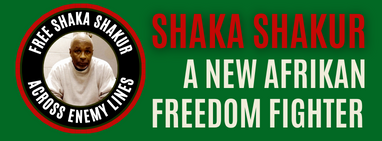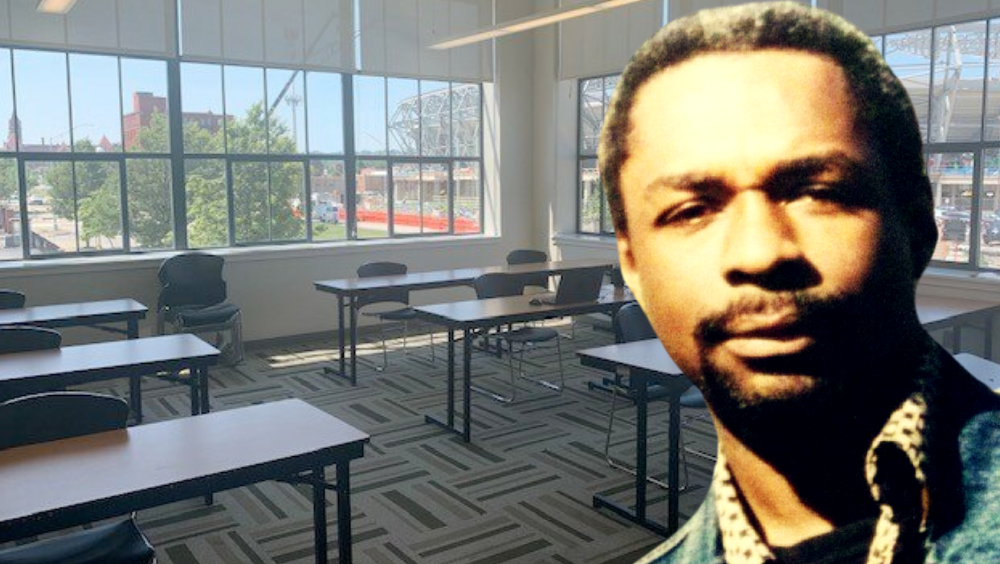The following interview with Shaka Shakur was conducted by Professor Angela Marino of UC Berkeley, for her students in “Performance and Law” during the fall 2020 Semester. It was conducted on October 25, 2020.
1) You’ve been involved in a political struggle for decades, how would you describe that struggle and its aims?
Prisons are a microcosm of society. The struggles, movements, some social events, etc. have a direct impact on what goes on in the prisons. You can trace this all the way back to the first establishment of prison and the post Civil War era. To the struggle for Integration/Civil Rights, the Black Power Movement, the struggle for Religious Freedom and Worship, to today’s Black Lives Matter Movement, etc..
When I first entered the system in the 80’s, there were the residual left overs from the 60’s & 70’s political movements. You also had a strong influence of cultural nationalism.
This was the scene for many of us of my generation who were coming into the system. Most of us were teenagers…I was a part of the first mass casualty of get tough on crime policies targeting specifically Black and Brown youth. It was before the gang bang era of the prison system of ’82’, ’83’.
A lot of our primary concern far as politics was that of confronting racism and beatings by prison guards. This was extremely blatant, intense and overt in the Central and Southern Region in the State of Indiana.
As some of us began to become politicized and organized, this focus also evolved into focusing on conditions of confinement, access to political materials, i.e. the right to have access to books about our heritage, history, struggles. In essence, the right to take responsibility for educating ourselves and raising our consciousness. The right to learn what we were not taught in the ghetto schools of amerika.
As we became politicized and proceeded to overstand the socio-economical & political nature of our captivity, we began to see ourselves as Political Prisoners and a victim of Neo Colonialism. Our Aims and Focus became that of transforming the Colonial Slave Mentality to that of a Revolutionary Mentality.
The Aim and Objective became raising political consciousness amongst the captured prison class, developing revolutionary political cadre who would return back to the community and join the struggle for human rights, self determination and liberation on the streets. We wanted to rebuild our communities and the radical movement towards transformation in this country, while supporting national liberation struggles.
On some levels we were idealist and romanticist. Some of us in fact underestimated our own institutionalization and the damage that had been done to us by our prison experiences.The fact that so many of us came back to prison or went out to the streets and collapsed, was an indication that solely focusing on the transformation of the criminal-colonial mentality was insufficient.
2) How do you see politics changing inside and outside the wall right now?
The struggle always has a high tide and a low tide. It’s called the ebb and flow of the movement. It also has a generational impact. Various generations that came into the prison system came in with their own ingrained socio political and social reflexes. Everything in prison is magnified by 10x. Concepts of respect, hate, fear, and self worth all become intensified under this bubble. This is even more so when you factor in toxic masculinity and patriarchy.
When I first came into the prison system in the 80’s, you had rules, rules of social conduct, rules to govern ourselves, outside of the prison rules, and not following these rules could cost you your life. With today’s generation not so much.
In the 80’s and throughout the 90’s, the state launched a COINTELPRO Shock Doctrine type campaign behind the walls. Prisoner-run programs and institutions such as the Lifers Organization, Jaycees, etc. that gave prisoners a certain degree of autonomy, self empowerment and responsibility were systematically dismantled. Supermax and Control Unit Prisons begun to flourish where prisoners and the prison leadership were targeted for sophisticated forms of torture such as social isolation, sensory deprivation and general slave breaking tactics/measures.
This left a vacuum within the prison population that was now being flooded with the consequences of George Bush’s and Bill Clinton’s policies on so-called crime and violence. We were also witnessing the casualties of the so-called War on Drugs and the flooding of the Black and Latino community with drugs and high-powered weaponry.
In Indiana and similarly in prisons across the country, prison populations were now being flooded with street organizations, those who were addicted to various drugs and other substances. People who were used to hustling or being a little better organized.
So instead of Politics being kept in Command, it became Economics, i.e. ‘Chasing the Bag’. That vulgar materialistic politics began to dictate and define all morals and principles. It began to reshape and redefine the social politics behind the walls.
Whereas before you were shunned and it was taboo if you used narcotics or certain substances, now it is common and a regular occurrence. People are locked up that need help and instead of getting treatment they’re criminalized and sent to prison. As the govt,/state slashed funding for this or that, cut programs, removed jobs, trades and access to grants for college enrollment… While the overall objective and material conditions become even more oppressive/repressive, people have increasingly self-medicated in an attempt to escape and numb that pain.
The same explosion of various substances within the community, also exploded behind the walls. In fact during the 80’s we watched the prisoncrats intentionally flood the prisons with psychotropic psych meds, addicting over half of the populations. This was used as a control mechanism and human experimentation. We were lab rats.
Targeted for the same addictions, deaths and accompanying violence that the state uses such not only as control mechanism, but also as job security.
You now need drug counselors, substance abuse or treatment programs based on manufactured and manipulated statistics that you use to request not only federal dollars, but use to argue for tougher on crime laws, truth in sentencing, new drug courts, etc. Never trust in politicians or prisoncrats.
With all of the above you have spurts and explosions of events and political movements that might explode onto the scene. Repression and Oppression always breed one of two things. It breeds either cowardice or resistance.
With the recent development of various movements like B.L.M., with the rebellions and protests around police killing unarmed civilians, debates and discussions about racism have generated discussions and dialogues behind the walls, sometimes amongst people and groups who ordinarily wouldn’t interact. It has motivated people to try and initiate various projects and programs, to initiate various collectives and sometimes spurts of rebellion.
In some of the prisons e.g. like Wabash, some of the housing units were placed on lockdown just for prisoners hollering or shouting outside or through their doors that Black Lives Matter!!
There has begun to be a reawakening behind the walls as social unrest unfolds on the streets. It has given rise to new formations and collectives behind the walls, newly developed and organized Political Education Study Groups.These new formations have begun to network with outside activist and radical groups fighting for social change and a removal of a corrupt and oppressive criminal justice system as we know it. This allows us to expose the human rights abuses within the Prison Industrial Complex. It also allows us as captives to take some control and responsibility over our lives and prepare ourselves for the streets.
3) What do prisons teach us about the nature of law and criminal justice in the u.s.?
Prison teaches us that the u.s. government with all of its chants of democracy, equal justice, etc. is, in fact, a paper tiger. It teaches us that for all the smoke and mirrors around the so-called progress that this society has supposedly made, that it is still two so-called Amerikas, one black and one white. That the u.s. is still a prison house of neo-colonized nations that are being super exploited.That social class and neo-colonialism still dominate and dictate the criminal justice system with an agenda of genocide and social control.
Prisons expose/reveal to us the intersectionality of social control, genocide and big business.
As prisoners, many of whom were railroaded, didn’t receive fair trials or had incompetent or overworked public defenders.
It teaches us that the criminal justice system as we know it can only be reformed so far and from its very inception it has never been about crime. It has always been about Social Control & Economics, thus the Prison Industrial Complex.
The criminal justice system represents one of the main pillars that the overall system of oppression, patriarchy and capitalist exploitation rests upon. It is how the various systems of oppression are legitimized in fact. How they are reinforced and used to intimidate and control the masses.
Prisons reveal and expose the cold naked truth about the justice system and show the cruelty that humanity visits upon humanity.
4) What contributions can a prison activist like yourself make towards the broader revolutionary transformation of the u.s.?
Prisons for the oppressed so-called disenfranchised masses and lower classes have to become our institutions of higher learning.The San Quentin’s, Pelican Bays, Angola’s and the like all have to become training grounds for cadre development of politically and socially developed prisoners who have the desire and commitment to return back to society and fight for its radical and revolutionary transformation.
This is why Political Prisoners, P.O.W.s and Prison Activists have to be supported.
Prisons are becoming more and more repressive and deadly, whether it’s through a Covid Pandemic, the brutalization by prisoncrats or the genocidal component of building prisons on top of landfills waste sites and having us drink and bathe in contaminated water that causes various forms of cancer.This reality reinforces the need to build this inside /outside support and network.
We need to advance the concept of Dual Power behind the walls, where prisoners take responsibility for developing and organizing their own educational programs, their own re-entry and counseling programs. Where we work on rebuilding and creating healthy men and womyn to return back to our communities as assets. People who are willing to reach back and fight for a new society as well.
Prisons are just another front of the larger revolutionary struggle. That is why we call it Behind Enemy Lines. While the state may intend to throw us away with its life sentences, as long as we can draw breath we have a role to play and a contribution to make.
As activists and revolutionaries enter the prisons and jails, as protesters now do, so shall the real dragons fly out of amerika’s prisons!
I would also add that with the advancement in technology such as cell phones and other communication devices, you see conscious prisoners networking and organizing by using social media platforms. Releasing videos and interviews of deplorable conditions under Covid, in the aftermath of so called riots, massive hunger strikes or work strikes as in Georgia. This is uncharted territory and the proverbial genie is out of the bottle and can’t be put back in.
How can you talk about the prisons in Iran, Venezuela or elsewhere when u.s. prisons in Alabama and Mississippi are live streaming videos to Facebook showing inmate bodies lying in the cell blocks or corridors of the prisons while guards ignore them or make rounds? Videos of raw sewage flooding the cells and cell blocks, prompting hip hop artists and others like Jay Z, Meek Mill to pay the legal fees of attorneys who will file class action lawsuits to shut these prisons down.
– Shaka Shakur
![]()

